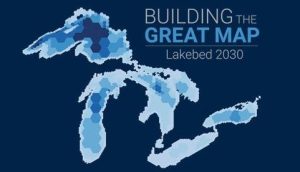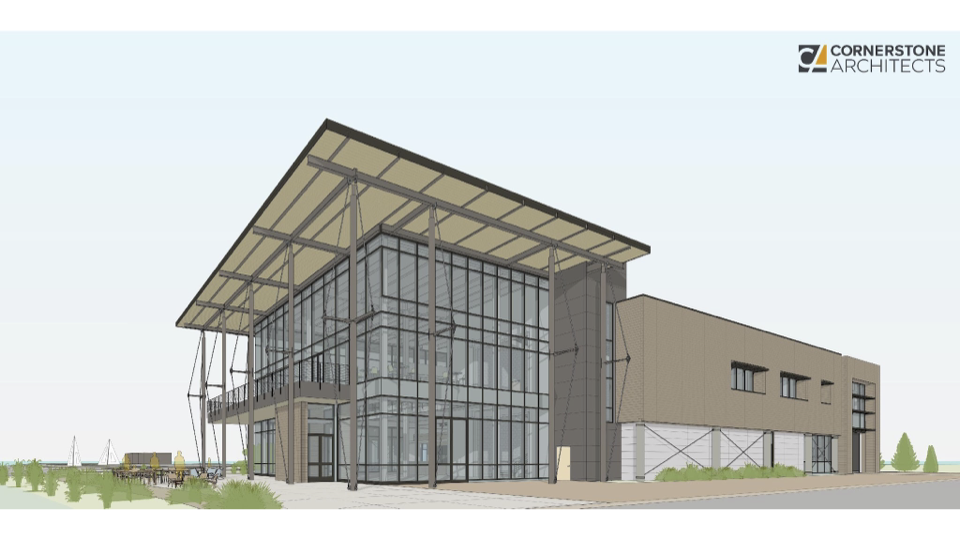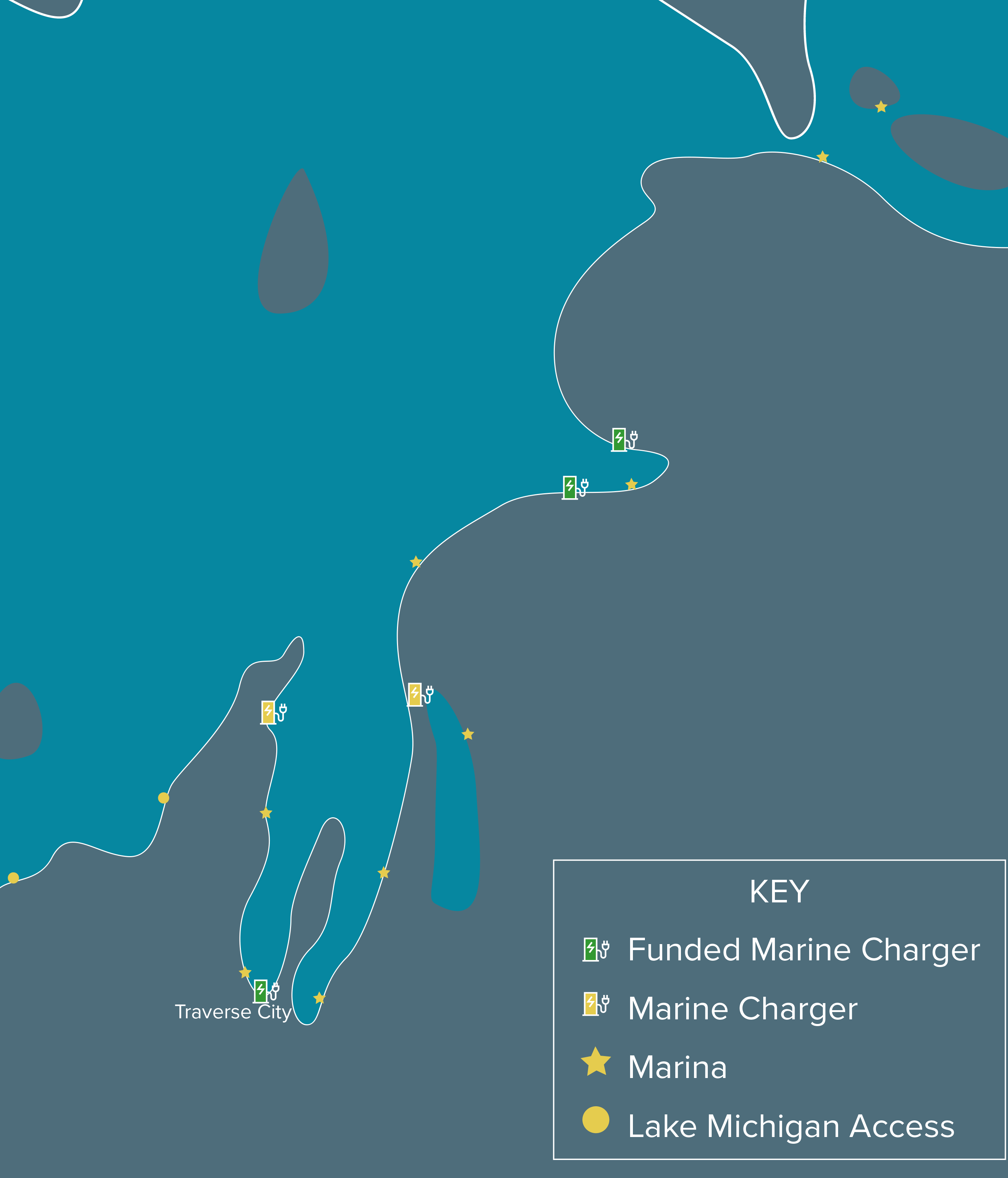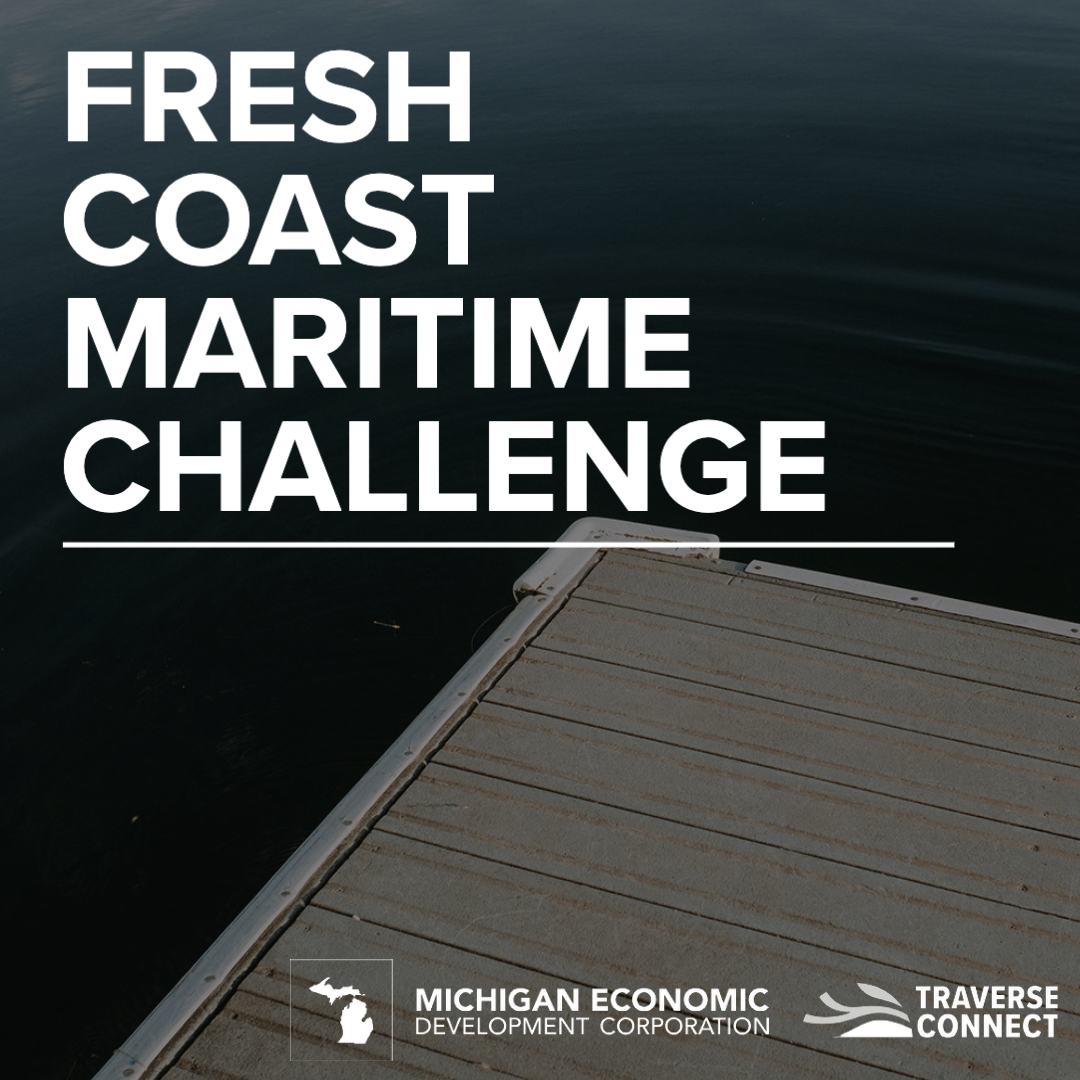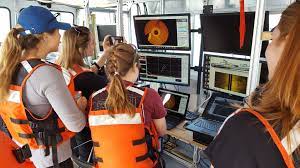
Electric boats racing on Elk Lake, Summer 2023 (Photo courtesy AQUA superPower)
Traverse City is at the Heart of the Great Lakes
NORTHERN MICHIGAN’S GEOGRAPHIC ASSETS, AT THE CENTER OF THE GREAT LAKES, MAKE IT PERFECTLY POSITIONED TO BE THE GLOBAL EPICENTER FOR FRESHWATER AND MARINE RESEARCH, INNOVATION, AND INDUSTRY.
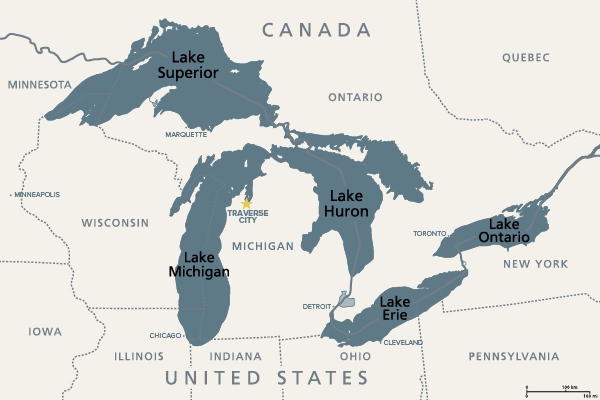

Harnessing the Power of our Freshwater Assets
Northern Michigan’s advancements in blue technology, combined with Michigan’s position as the global mobility and manufacturing capital, prime the region to deepen its partnership between marine innovation and the preservation and conservation of critical Great Lakes freshwater resources.
We are harnessing the power of our region’s Great Lakes assets to position the region as a nationally and internationally recognized center for full life-cycle bluetech incubation, acceleration, and commercialization.
Read More: CHARTING NEW WATERS: NORTHERN MICHIGAN’S BLUE TECH REVOLUTION
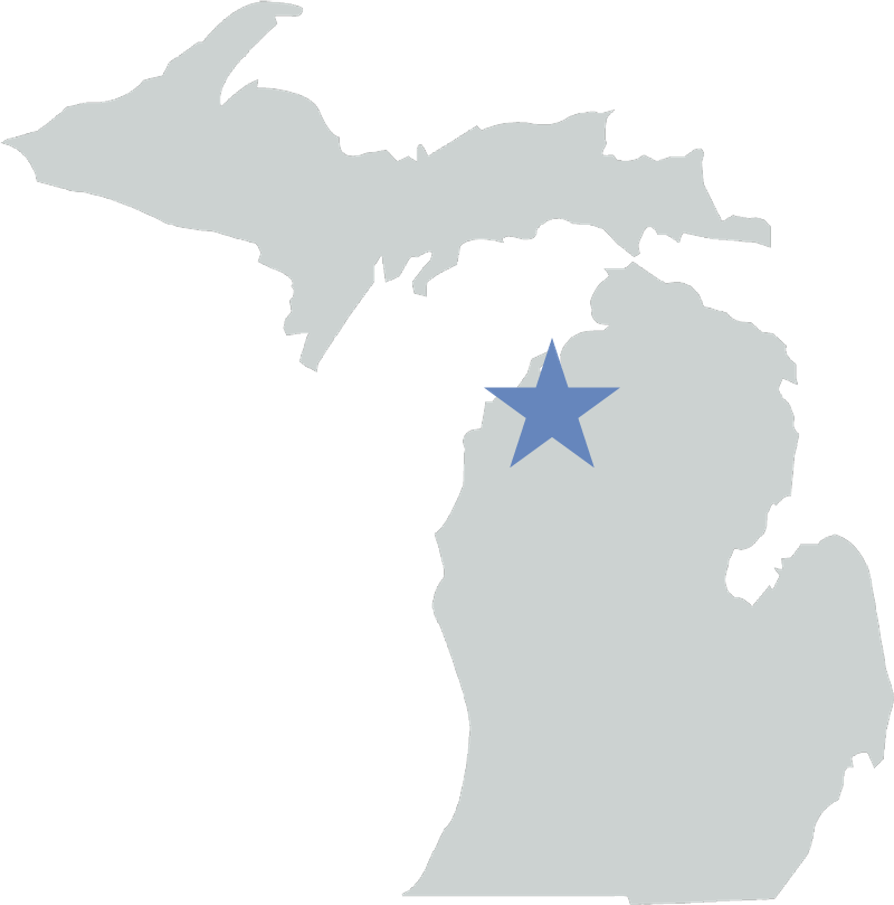
Northern Michigan's Blue Economy
Our region is looking forward to a bright future amidst the burgeoning blue economy, estimated to grow to $3T globally by 2030 (The World Bank). By pairing our unique geography and unparalleled access to water with the surge in freshwater and marine innovation and research advancements, there is great opportunity to create new cleantech, forward-thinking businesses, while protecting and preserving the Great Lakes.
Traverse City Freshwater Research & Innovation Center
The Traverse City Freshwater Research & Innovation Center is being developed on the existing Discovery Center & Pier property on West Grand Traverse Bay. This 40,000 sq.ft. research center will become the hub for the commercialization of freshwater and marine technology applications, turning ideas into businesses, and finding innovative solutions to protecting our freshwater resources. The Center will operate incubation and accelerator programming and requisite lab space to support early startup businesses. This project will drive economic growth and establish the Grand Traverse Region and Michigan as the global hub for applied bluetech innovation.
Freshwater Research & Innovation Center Receives $15M in State Budget ~ The Ticker, June 2023
Gold In The Water: Local Partners Band Together To Make Traverse City A Global Freshwater Leader ~ The Ticker, July 2022
The Traverse City Freshwater Research & Innovation Center is being led by these Collaborative Regional Partners: Northwestern Michigan College, Michigan Technological University, 20Fathoms, Discovery Center & Pier, and Traverse Connect.
Marine Electrification & The Fresh Coast Corridor in Northern Michigan
Making Waves: The Future of Boating is Electric
Our regional lakeshore and its waterways, with a high concentration of marinas and harbors, is highly trafficked by watercraft and are primed to be an early adopter for the availability of e-boat charging locations and e-boat dealers. With Elk Rapids Marina now selling XSHORE 100% electric boats, the transition to electric boating has already begun and Traverse Connect is propelling this momentum forward.
Our vision is to be “ground zero” for this new industry by bringing the first freshwater e-boat charging “corridor” to the Midwest and the U.S., running from Frankfort northwards to Mackinac Island. This route has been dubbed “the boating capital of the Midwest,” and with a considerable concentration of wealth and accessibility to recreational boating, the market is prime for early adoption of new technologies.
Fresh Coast Maritime Challenge
Enabling the future of boating by electrifying Northwest Michigan’s waterways
Launched in 2023, the Fresh Coast Maritime Challenge, is a first-of-its-kind program in the United States putting Michigan at the forefront of future-proofing sustainable maritime transportation including recreational boating activities, marina innovation, as well as commercial activities on the Great Lakes. The Challenge established a dedicated grant program that offers companies the opportunity to apply for assistance that supports the decarbonization and electrification of both marinas and watercraft across the state. The funding period has now closed. Stay tuned to Michigan’s Office of Future Mobility & Electrification for updates and to apply for funding via the Michigan Mobility Funding Platform.
Electrifying The Bay: Inside The State-Backed Grant Program That Will Make Northern Michigan An Electric Boating Hub ~ The Ticker, April 24, 2023
Sea Change: Why The Electric Boat Industry Is Sailing Toward Northern Michigan ~ The Ticker, July 10, 2022
Watch the Video: AQUA superPower’s Electric Boat Demo Day at Elk Rapids Marina – August 2023
Mobility & Recreation Industries: A Key Focus for Michigan
Where the Mobility Industry Intersects with the Recreation Industry, there is Great Potential for New Innovation & Development.
The Michigan Economic Development Corporation’s (MEDC) most recent strategic plan targets automotive manufacturing, e-mobility, and electrification as strategic industries to develop. Michigan’s Outdoor Recreation Industry Office also highlights outdoor recreation as a statewide strength, championing the business development case where e-mobility and outdoor recreation meet. As the lead organization of economic development in Region 2, Traverse Connect is working closely with the MEDC and the other economic development collaboratives to bring new enterprises to the state that are at the forefront of mobility and electrification technology – including freshwater and marine technologies, provide them with a test bed for their new technologies, facilitate key partnerships and introductions, navigate state infrastructure, and assist with site selection for company offices and headquarters.
Read more: Connecting the Dots: Michigan’s Outdoor Recreation & Mobility Industries
Read more: All Electric, All the Time: Electric Cars, Boats, and Bikes Race to Northern Michigan
Spotlight on Northwestern Michigan College
The Great Lakes Water Studies Institute Leads Cutting-Edge Freshwater Research and Learning
Companies from across the country — and around the world — are coming to Northwestern Michigan College to recruit students straight out of its Great Lakes Water Studies Institute (GLWSI) programs. With its location on the shores of Lake Michigan, access to research vessels, and collaboration with international partners, the GLWSI programs offer a unique, hands-on opportunity for learning, training, and pioneering new technology. The bachelor’s degree in Marine Technology is one of the only marine technology programs in the country and features courses not even offered at large coastal universities. Hosting such a future-focused education program benefits job growth and business attraction for northern Michigan’s economy. Not only do students come from across the country to attend the program, but industry partners from across the globe also come to Traverse City to utilize the specialized training and recruit skilled talent.
“Small, but mighty: NMC degree making international waves” ~ The Record Eagle, June 13, 2022
Watch: Closing the Skill Gap: Focus on the ‘Blue Economy’ (NMC Webinar from October 6, 2022)
AquaHacking Great Lakes Challenge
The AquaHacking Great Lakes Challenge
The Great Lakes AquaHacking Challenge is an entrepreneurship competition that encourages new technologies and innovations to address freshwater issues in the Great Lakes. The challenge is hosted by AquaAction, in partnership with Northwestern Michigan College. Stay tuned at aquaaction.org for announcements on the The Great Lakes AquaHacking Challenge 2024/24!
Read More: Microplastics filter for laundry wins top prize at Great Lakes AquaHacking challenge
~ Michigan Advance, May 2024
Northern Michigan's Freshwater & Marine Industry Cluster: Companies, Organizations & Initiatives
The Boardman River Dams Ecosystem Restoration Project will reconnect over 160 miles of free-flowing, cold-water stream and restore hundreds of acres of wetland and upland habitat. It is one of the most comprehensive dam removal and restoration projects in Michigan’s history and one of the largest such projects in the Great Lakes Basin.
The Traverse City Downtown Development Authority kicked off a civic engagement design process in 2018 to lead the Lower Boardman River Unified Plan, which provides a cohesive vision for the river corridor, as well as steps to address land use, public access, infrastructure, culture, and habitat. The scope of this plan encompasses the 1.6 miles of the Boardman/Ottaway River that meanders through Downtown – from the northern shore of Boardman Lake to Lake Michigan.
FishPass is the capstone of a ~20y restoration project on the Boardman/Ottaway River, re-connecting the river with Lake Michigan. FishPass is led by Great Lakes Fishery Commission, in partnership with the City of Traverse City, Grand Traverse Band of Ottawa and Chippewa Indians, and many other partners. FishPass will replace the failing Union Street Dam with a new labyrinth weir and infrastructure that will allow researchers to sort and selectively pass desirable native fishes while blocking harmful invaders like sea lamprey.
Headquartered in Traverse City, Circle of Blue creates award-winning nonprofit journalism from the frontlines of water, food, and energy in the changing climate. Its visionary work across the Great Lakes, U.S., China, Australia, Mexico, India, and the Middle East earned the Rockefeller Centennial Innovation Award, one of the nation’s top honors. Circle of Blue meets the demand for information and collaboration in the challenge of the century: water.
The Conservation Resource Alliance (CRA) is part of a nationwide network of Resource Conservation and Development Councils. The organization serves northwest lower Michigan. CRA’s RiverCare Program was created to guarantee that natural resource professionals maintain a consistent and prioritized action plan for each river in CRA’s region, find and repair physical problems before they become worse, and maintain efficient, coordinated local river committees of agency, resident, and interest group representatives.
The mission of the Discovery Center & Pier is to connect people of all ages, needs, and abilities to the Great Lakes through recreation, education, science, history and stewardship.
For Love of Water (FLOW) is a nonprofit organization whose mission upholds that certain natural resources like navigable waters are preserved in perpetuity for the benefit of the public to use and enjoy. FLOW seeks to safeguard the Great Lakes, the planet’s largest freshwater lake system, by advancing public trust solutions and cutting-edge policy work. FLOW has built key partnerships with state and regional Great Lakes groups, leveraged their expertise to influence agencies and impact state and federal legislation, and grown to be a trusted source of current information on issues affecting our freshwater seas.
Great Lakes Environmental Center, Inc. (GLEC) is an established national contracting firm offering applied environmental sciences, research, and compliance assistance focused on water quality and the protection of aquatic ecosystems. GLEC has grown steadily in each year of its existence, delivering services and solutions to government and commercial clients throughout North America. The dedicated employee-owners at GLEC often set the standard in their respective fields by consistently applying our core philosophies of scientific excellence, corporate responsibility, environmental stewardship, and dedication to fulfilling client needs. Our unique experience serving both regulatory agencies and the regulated community translates into viable, insightful, and creative solutions to complex environmental challenges.
Inside the Great Lakes Research Center (GLRC), biologists, geologists, engineers, chemists, remote-sensing specialists, and computer scientists work together along Michigan Tech’s Innovation Shore. GLRC research vessels launch right from campus on the Keweenaw Waterway, just miles away from Lake Superior. Activities include deploying under-ice robots, studying lake ecology and fish biology, capturing sonar images with autonomous subsurface vehicles, and investigating aerosol chemistry and how warm winters impact the coastal food chain.
Based out of the Boardman River Nature Center, the Grand Traverse Conservation District provides gateways to the natural world, restores natural areas, trains future generations of conservation leaders, and supports sustainable, local agriculture. Their “Protecting Our Lakes & Shorelands” series is available here.
Hybrid Robotics design and manufacture marine robotic solutions for research and inspections. They have developed systems for unmanned surface vessels to complete routine, as well as high-risk, marine missions previously inaccessible due to technological and environmental limitations without the need for a boat, divers, or aerial support.
The Inland Seas Education Association provides learners of all ages with hands-on experiences aboard traditionally rigged tall ship schooners, along the shores of the Great Lakes, and in local rivers, streams, and wetlands. As a non-profit organization located in Suttons Bay, Michigan, its goal is to provide people with the information they need to become stewards of the Great Lakes.
OLA Filter is an easy-to-use, affordable water filter that uses ultrafiltration technology to remove bacterial contamination from drinking water in developing countries. The product was co-invented by Traverse-City based inventor Theresa Smith.
Quantum has taken the art and science of sailmaking to the highest level to produce the most efficient and fastest sail shapes possible. Quantum’s proprietary iQ Technology® system was created by experts with over 20 years of knowledge and expertise in both sailing and the complexities of engineered structures. Integrating state-of-the-art sail design and manufacturing methods with on-the-water-testing, Quantum® sails are perfected to offer sailors of all levels outstanding performance, consistency, and repeatability.
The Watershed Center of Grand Traverse Bay has a 20 year history of protecting and preserving Grand Traverse Bay and its 1,000-square mile watershed through on-the-ground projects and advocacy.
Some of their projects include the Boardman River Watershed Prosperity Plan – a vision and roadmap for the future management of one of Michigan’s most beautiful watersheds. It meets the community’s desire to have a management plan for the river and provides a blueprint for multi-jurisdictional cooperation to improve the environmental, economic, and social prosperity of the watershed region.
SampleServe is a user-friendly app and platform that simplifies environmental sample collection, project management, and communication between technicians, managers, and labs, and then quickly generates a wide variety of regulatorily required reports.
Solve for X, L3C / The SolvePFAS Projects: Michigan is one of the first states in the nation to design and implement a multi-pronged strategy to detect, measure, and eradicate PFAS in ground and surface water. The company has five projects in development to address PFAS:
- a mobile PFAS Laboratory for in situ sample diagnostics
- a handheld sensor for detecting PFAS, algae, e. coli and other contaminants in real-time
- an Environmental Impact Investment platform focused on innovative water, air, and soil stewardship
- a catalog of carbon-negative or -neutral products for water and soil treatment, and carbon sequestration
- a catalog of PFAS-free products to replace the ‘forever chemicals’ in industrial & consumer supply chains
Vector Center helps companies, institutions, and governments navigate and mitigate profound water and systemic risks. Their revolutionary Perception Reality Engine™, provides real-time, contextualized intelligence for decision-makers about water and intersecting threats around the globe at a moment when risks are becoming realities.
Vector Center’s approach combines state of the art satellite data, social sentiment analysis, and on-the-ground investigative research backed by a network of best-in-class, purpose-driven innovators at the forefront of sustainability, analytics, and global trends.

